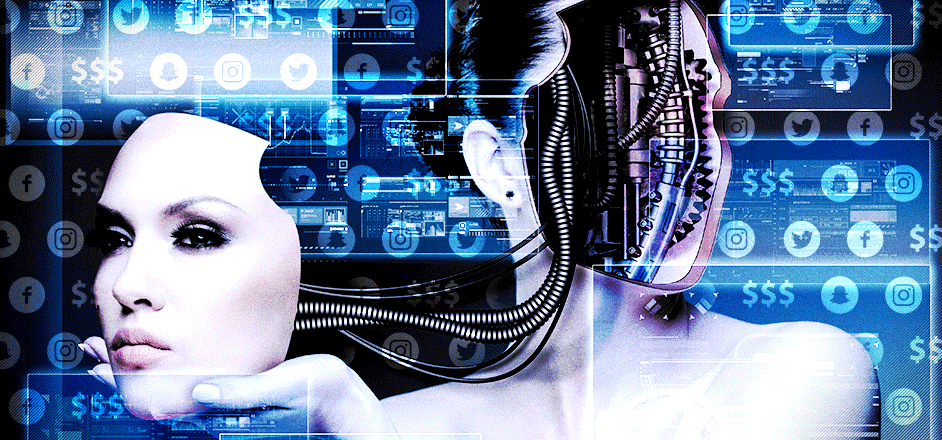Fake personas are nothing new on the Internet.
In the past, though, they’ve just been nameless trolls, roaming the wastelands of the web, sewing anger and discontent as they made their way. But that’s not always the case anymore. These days, some Internet personas are generating high influencer incomes with their uncanny physical perfection and unnatural beauty…
Because they are unnatural. They are, in fact, computer generated avatars — digital art, for all intents and purposes — with their own social profiles, “personalities” and backstories. And they’re making some serious cash.
Like Miquela Sousa aka “Lil’ Miquela”. She’s a Brazilian-American Instagram star with 1.4 million followers, who has even appeared in Vogue and Paper Magazine. Take one look at her and it’s easy to see why: perfect bangs, almond shaped eyes, juicy lips, insanely cute freckles, and hair that looks slightly… airbrushed.
They have almost crossed the uncanny valley.
This is not an easy concept to wrestle with – that artificial entities are starting to populate our social media circles. Like video game characters who’ve wandered out of the console and found a new home on Instagram, where they can draw upon the adoration of real humans in the real world; digital attention whores feeding on our likes and follows.
They are not autonomous, though. Not yet, at least. These faux models are created, designed, and managed by actual people out there, designer entities, often, who have mysterious motives. They are using their digital brain-children to sell clothing, promote their businesses, and even, spread social and cultural messages – to shape our culture.
Take for instance the faux Instagrammer Louise Delage. Delage’s Instagram account was filled to the brim with model quality photos, each teased to beautiful perfection, crafted to stoke attraction, kindle envy and admiration in digital passersby. And, in almost every picture, she was holding a drink.
Turns out, her entire account was just one long, drawn out PSA about alcoholism called “Like my Addiction”.
Cheers Louise.
“It’s easy to miss out on the alcoholism of a loved one,” Isabelle Picot, the associate director of the Like My Addiction campaign, told Adweek. “The Actions Addictions Fund wanted to highlight this difficulty to promote its platform,” she says.
These online characters aren’t just posting sexy photos to Instagram, either. They are starting to interact with each other within the digital world that we connect to externally. Yes. They are hacking each other’s accounts and making enemies and friends in the digital sphere.
Look at Lil’ Miquela. Her Instagram account got hijacked by another fake online personality, @BermudaIsBae, a Trump-loving “robot-supremacist”. @Bermudaisbae hacked her account and started posting fake pictures of her fake self, on fake Miquela’s account, blackmailing her with the message, “you can’t have your account back until you promise to tell people the truth”… the two are now fake besties, apparently, and regularly post fake photos together to their real Instagram accounts.
So, everything worked out, I guess?
Needless to say, things are getting very twisted down here on Earth. These strange times are only getting stranger, faster, and we’re going to have to learn to cope with these kinds of lurching leaps in social technology, that seem weird and unnatural, lest we go insane.
But we should not abandon caution in the face of such futuristic conundrums.
Because, they could warp us to a dangerous degree – change our society and our way of thinking. Just like Louise Delange tried to with her anti-alcohol message. The problem is, we do not know who is behind these social media “influencers”. We do not know what kind of agenda or platform the creators of these avatars have, or what kinds of hidden messages they might be trying to slip our youth, like some kind of digital roofie.
And beyond all that, it’s just simply setting the bar too damn high! Human models – actual people – are already pushing unrealistic standards of beauty and fitness and body shape on the young people of America. Kids already look at models in magazines and think, “If only I could look that pretty – that hot… If only I could be that skinny… if only I could be like that…”
Well, keep dreaming kiddos. Because (and I hate to be the one to break this to you) you’ll never be as perfect as a computer generated graphic model. None of us ever will. Not me or you or any movie star, any model, not even Jennifer fucking Lawrence. That kind of perfection only exists in two places: the mind and the digital world.
It’s a good thing, trust me. Beauty in its truest form – the real-deal, punched-in-the-gut, breath-taking, marry-me kind of beauty that strikes you dumb and lifts your soul – is wrought from natural imperfection. And it is something that computers will never be able to take from us.
No matter how many followers they have.



Leave a Reply